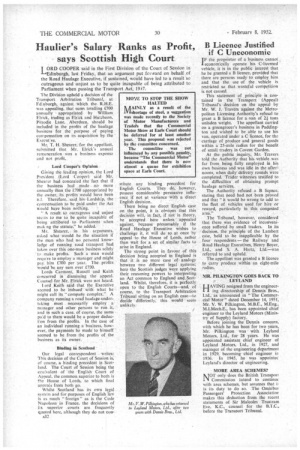B Licence Justified if C Uneconomic
Page 34

If you've noticed an error in this article please click here to report it so we can fix it.
IF the proprietor of a business cannot:. 1. economically operate his C-licensed vehicle, it is in the public interest that he be granted a 13 licence, provided that there are persons ready to employ him and that the use of the vehicle is restricted so that wasteful competition is not caused.
This statement of principle is contained in the Transport (Appeal) Tribunal's decision on the appeal by Mr. W. I. Travers against the Metropolitan Licensing Authority's refusal to grant a B licence for a van of 21 tons unladen weight. The appellant carried on a greengrocer's business in Paddington and wished to be able to use his van, operated under a C licence, for the carriage of produce and general goods within a 25-mile radius for the benefit of small traders in Covent Garden.
At the public inquiry, Mr. Travers told the Authority that his vehicle was far from being fully employed in his own business and was idle in the afternoons, when daily delivery rounds were completed. Trader witnesses testified to the difficulties of obtaining prompt haulage services.
The Authority refused a B licence, stating that need had not been proved and that "it would be wrong to add to the fleet of vehicles used for hire or reward, particularly in this congested area."
The Tribunal, however, considered that there was evidence of inconvenience suffered by small traders. In its decision, the principle of the Lambert case, held to -be inapplicable by the four respondents —the Railway and Road Haulage Executives, Henry Boyer, Ltd., and S. A. Hartz, Ltd.—was referred to and upheld.
The appellant was granted a B licence to carry produce within an eight-mile radius.
MR. PILKINGTON GOES BACK TO LEYLAND
HAVING resigned from the engineer /. ing directorship of Dennis Bros., Ltd.,' as announced in "The Commercial Motor" dated December 14, 1951, Mr. V. W. Pilkington, M.B.E., M.Eng., M.I.Mech.E., has been appointed chief engineer to the Leyland Motors (Minis. try of Supply) factory.
Before joining the Dennis concern, with which he has been for two years, Mr. Pilkington was • with Leyland Motors, Ltd., for 28 years. He was appointed assistant chief engineer of Leyland Motors, Ltd., in 1927, and manager of the engineering department in 1929, becoming chief engineer in 1936. In 1945, he was appointed Leyland's director of engineering.
MORE AREA SCHEMES? MOT only does the British Transport Commission intend to continue with area schemes, but assumes that is its duty to do so. The Omnibus Passengers' Protection Association makes this deduction from the recent statements of Sir Malcolm Trustram Eve, K.C., counsel for the B.T.C., before the Transport Tribunal.




























































































